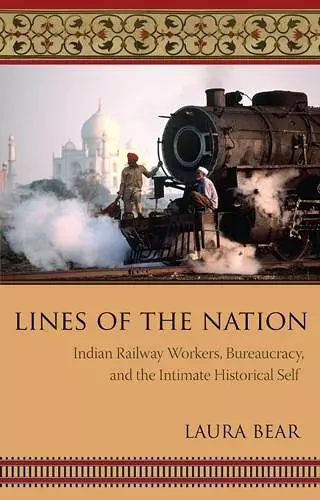Lines of the Nation
Indian Railway Workers, Bureaucracy, and the Intimate Historical Self
Format:Hardback
Publisher:Columbia University Press
Published:6th Jul '07
Currently unavailable, and unfortunately no date known when it will be back

Lines of the Nation is a beautifully crafted ethnographic history, steeped in personal and railway archives and in the oral accounts of Anglo-Indians who live the racial predicaments of colonial and contemporary India. Laura Bear shows deftly the potencies of a colonial past that emerges in the pedigrees they seek to establish and in the intimate interstices of Anglo-Indians families whose anxieties about national and racial belonging shape the ways they draw on colonial differences as they draw away from them. This is a story of an unruly colonial past that permeates their relationship to the documentary state and to the living archives through which they make their precarious place in the present. -- Ann Laura Stoler, Willy Brandt Distinguished University Professor of Anthropology and Historical Studies, New School for Social Research This is the first systematic and theoretically sophisticated analysis of the cultural life of the Indian railways. Lines of the Nation gives us a compelling story of how railways were introduced, expanded, and managed in colonial and postcolonial India. Laura Bear shows convincingly that railways not only were at the heart of colonial and postcolonial state formation but also were central to debates on public morality, caste, and the anxieties of race, blood, and self-making in the Anglo-Indian community, India's premier railway caste. An important book that breaks new ground and deserves a wide readership beyond South Asia. -- Thomas Blom Hansen, author of Wages of Violence: Naming and Identity in Postcolonial Bombay Laura Bear's tremendously informative and insightful study of the Indian Railways is an important reminder of the value of historical anthropology to the present. Bear's story of the problems that arose, and the opportunities that were created, during and after the construction of one of the world's most extensive railway networks will give policymakers and citizens alike plenty to ponder. Meticulous in its archival research and evocative in its ethnographic descriptions, this is a delightful and thought-provoking contribution to the debate. -- Akhil Gupta, University of California, Los Angeles
Provides the history of the Indian railways. from the design of carriages to the architecture of stations, employment hierarchies, and the construction of employee housing, this book explores the public spaces and social relationships created by the railway bureaucracy. It traces their influence on the formation of Indian nationalism.Lines of the Nation radically recasts the history of the Indian railways, which have long been regarded as vectors of modernity and economic prosperity. From the design of carriages to the architecture of stations, employment hierarchies, and the construction of employee housing, Laura Bear explores the new public spaces and social relationships created by the railway bureaucracy. She then traces their influence on the formation of contemporary Indian nationalism, personal sentiments, and popular memory. Her probing study challenges entrenched beliefs concerning the institutions of modernity and capitalism by showing that these rework older idioms of social distinction and are legitimized by forms of intimate, affective politics. Drawing on historical and ethnographic research in the company town at Kharagpur and at the Eastern Railway headquarters in Kolkata (Calcutta), Bear focuses on how political and domestic practices among workers became entangled with the moralities and archival technologies of the railway bureaucracy and illuminates the impact of this history today. The bureaucracy has played a pivotal role in the creation of idioms of family history, kinship, and ethics, and its special categorization of Anglo-Indian workers still resonates. Anglo-Indians were formed as a separate railway caste by Raj-era racial employment and housing policies, and other railway workers continue to see them as remnants of the colonial past and as a polluting influence. The experiences of Anglo-Indians, who are at the core of the ethnography, reveal the consequences of attempts to make political communities legitimate in family lines and sentiments. Their situation also compels us to rethink the importance of documentary practices and nationalism to all family histories and senses of relatedness. This interdisciplinary anthropological history throws new light not only on the imperial and national past of South Asia but also on the moral life of present technologies and economic institutions.
A most worthwhile read. -- Ian J. Kerr American Historical Review This fine piece of scholarship deserves to be read by all those who wish to contribute to the field of historical anthropology. -- Manish K. Thakur Journal of the Royal Anthropological Institute Lines of the Nation is a substantial contribution to the study of the railway in South Asian history and society. H-Travel
ISBN: 9780231140027
Dimensions: unknown
Weight: unknown
360 pages